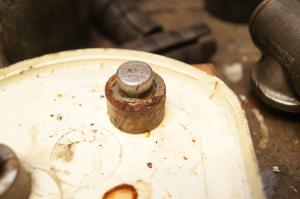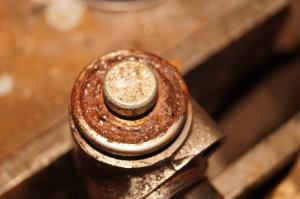Brake fluid
Traction Owner’s Club › Forums › Technical › Brakes › Brake fluid
- This topic has 1 reply, 2 voices, and was last updated 6 years, 2 months ago by Bernie.
-
AuthorPosts
-
2nd October 2019 at 11:09 pm #25600
Chris
ParticipantA couple of points about brake fluid have come up recently:
First – I heard indirectly that someone has been recommending using LHM as brake fluid in Tractions. I have not heard this myself – but it is definitely not a good idea. The seals are not designed for LHM and won’t like it one little bit. So please don’t do it.
The other thing is about silicone fluid (DOT 5). I have used this is at least one (Triumph) car and found no problems. I use the regular DOT 4 in my Traction and it is due for a change. I have no problems with DOT 4 so will probably just use that.
There are 2 advantages with Silicone that I know of – first it is not hygroscopic so there should be no corrosion in the cylinders. The other advantage is that it does not attack paintwork – particularly useful if you are using a pressure fed bleeder and the cap comes off (ask me how I know). The disadvantage of silicone is that it is slightly more compressible than DOT4 and therefore may give a slightly spongier feel.
But here’s a comment from Philip Vesey Holt about his experience with Silicone
“The Traction is the only car I run on silicone brake fluid and the results are disappointing. The pistons in all the brake cylinders were gummed up with corrosion. Looking at my maintenance record I had the same problem in 2015. There could be other causes than just the fluid. Lack of use, the car does about 1000km a year, may be an issue, or possibly poor quality seals letting the fluid past. This is not a problem I have with ordinary brake fluid or lhm cars. Do other owners have any experience with silicone fluid?”


Anyone else have any problems with Silicone?
Chris
4th October 2019 at 10:23 am #25612Bernie
ParticipantNo!
I have used silicone in my Tractions for many years and have not experienced any problems myself. Nevertheless, I have heard a couple of tales of people who did have problems similar to those of Phil (above).
I have personally converted two systems, making the change from ornery stuff to silicone. On the first occasion (in the early ’90s) I was rebuilding a Light 15 for a friend. The pipework was flushed but all 5 cylinders were brand new and, although they had not seen any other fluid, they were dismantled and all the seals rinsed and then coated with the new fluid before fitting. Having a small drop of fluid inside the dust boots minimises the chance of atmospheric moisture attacking areas of the pistons and cylinders which are not permanently immersed in fluid.
The second was my own Légère. In light of the successful experience with the Light 15, I made that change shortly afterwards. That time the whole system was flushed thoroughly and, although the actual cylinders were not changed, all the seals in the master and all four wheel cylinders were replaced with new parts and “wetted” before introducing the silicone fluid.
My experience was that the pedal was very firm on both cars. Te Light 15 is still with the same owner and the brakes have never been a problem . The Légère brakes were still fine when I finally sold it in 2016.
The 15/6 was already on silicone when I bought it in 2016 . Had I not been assured all the cylinders had been replaced, I would have checked them myself and, if nothing else, I would have replaced all the seals as a priority. Again, the pedal is firm and the brakes are very positive.
Based on my own experience, I think the answer very probably lies in ensuring all components are clean and in perfect condition from the offset. Assuming this precaution is taken, I have no hesitation in recommending the use of silicone brake fluid.
Finally, in addition to the two advantages mentioned by Chris, I reckon there is a third …. as he says, the silicone fluid is non-hygroscopic and does not absorb moisture from the atmosphere so, unlike the ornery stuff, it will not need to be changed every couple of years (especially if the vehicle only covers a low annual mileage).
B…………
-
AuthorPosts
- You must be logged in to reply to this topic.
